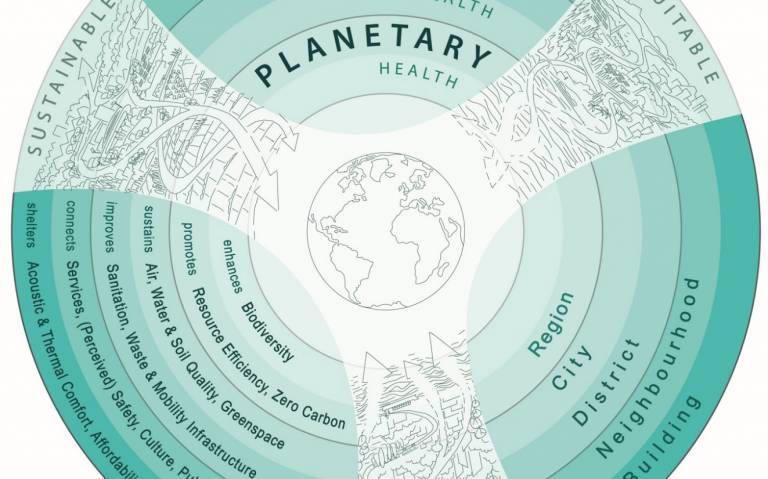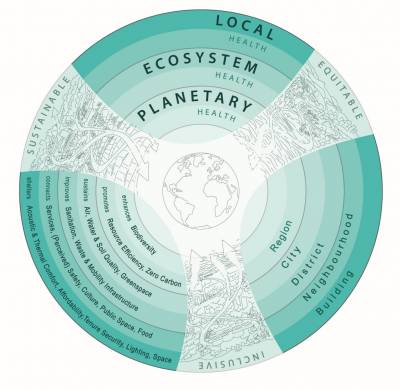New framework redefines ‘healthy’ urban development
29 June 2020
UCL Institute for Environmental Design and Engineering (IEDE) academic redefines healthy urbanism in new THRIVES framework to respond to pressing global challenges

The new THRIVES framework raises the importance of environmental degradation and structural barriers to health in urban policy and development.
THRIVES stands for ‘Towards Healthy uRbanism: InclusiVe Equitable Sustainable’.
The research is published in two articles in Cities & Health. THRIVES builds on theory and new research, and it was tested in a participatory workshop with built environment and health practitioners.
Helen Pineo, Lecturer in Sustainable and Healthy Built Environments at IEDE and author of the THRIVES framework says:
“Today’s biggest challenges such as the climate crisis and widening inequalities require a fundamental shift in understandings of healthy urbanism – including policies and decisions that shape neighbourhood and building design. Covid-19 has put a spotlight on equity and inclusion, yet these essential components of healthy development are not widely understood among built environment and property professionals. THRIVES aims to fix that gap.”
The framework was informed by Dr Pineo’s research with Guy’s and St Thomas’ Charity in South London. CEO of the charity, Kieron Boyle says:
“The built environment is a powerful tool for tackling health inequalities. Guy's and St Thomas' Charity are pleased to support the THRIVES framework as a tool for integrating health and wellbeing into new developments. We have a significant property portfolio and believe THRIVES will help us and others shape healthier places through the management of our assets."
THRIVES refocuses attention towards:
- awareness that health impacts often occur far away from new development or many years after construction, requiring design teams to think of impact beyond property boundaries;
- structural barriers to health that are caused by urban design processes and outcomes that exclude groups in society, including: low income, children, women, disabled, elderly and ethnic minorities;
- the urgency of environmental degradation that is caused by urban environments, affecting health through many pathways including extreme weather.
Community representatives and practitioners working in urban policy, design, property development, and public health can use THRIVES to reach shared understanding and inform decisions. More information is available at www.healthyurbanism.net.
Helen Pineo and Gemma Moore (a collaborator in developing THRIVES) were awarded funding from the Bartlett Innovation Fund to co-develop online training. This is being done in partnership with an advisory group including representatives from Public Health England, Faculty of Public Health, Guy’s and St Thomas’ Charity, London Healthy Place Network, Royal Institution for Chartered Surveyors, Royal Town Planning Institute, Town & Country Planning Association and other organisations.
The THRIVES framework forms part of the curriculum for the IEDE MSc in Health, Wellbeing and Sustainable Buildings. Applications are open for study on our programme in 2020-21.
References
Pineo, H., 2020. Towards healthy urbanism: inclusive, equitable and sustainable (THRIVES) – an urban design and planning framework from theory to praxis. Cities & Health 0, 1–19. https://discovery.ucl.ac.uk/id/eprint/10103902/
Pineo, H., Moore, G., Braithwaite, I., 2020. Incorporating practitioner knowledge to test and improve a new conceptual framework for healthy urban design and planning. Cities & Health 0, 1–16. https://discovery.ucl.ac.uk/id/eprint/10103903/

Figure 1: THRIVES Framework – Towards Healthy uRbanism: InclusiVe Equitable Sustainable

Funding information:
- This research was supported by funding from Guy’s and St Thomas’ Charity and the Complex Urban Systems for Sustainability and Health project (Wellcome Trust grant 209387/Z/17/Z).
- Read the paper 'Towards healthy urbanism: inclusive, equitable and sustainable (THRIVES) – an urban design and planning framework from theory to praxis'
- Read the paper 'Incorporating practitioner knowledge to test and improve a new conceptual framework for healthy urban design and planning'
 Close
Close

